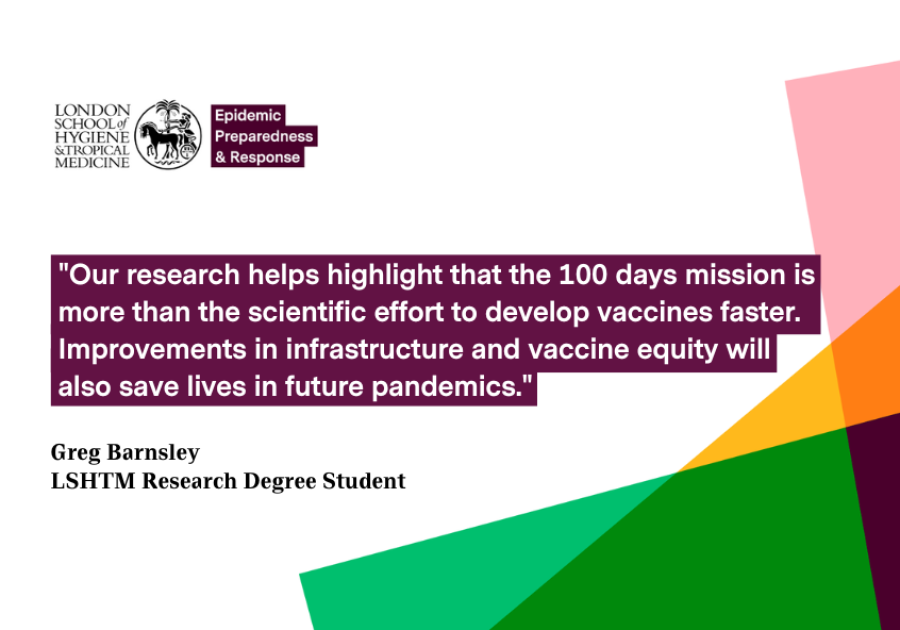
If COVID-19 vaccines had been delivered within 100 days, 8.3 million additional lives could have been saved, according to research published in The Lancet Global Health.
The modelling study, involving the London School of Hygiene & Tropical Medicine (LSHTM) with Imperial College London and other partners, also indicated that people living in low- and middle-income countries might have benefited most – avoiding 4.8 million deaths – if vaccines had been delivered within three months.
The researchers used existing mathematical models to understand the spread of COVID-19 and projected what would have happened under three different scenarios: rapid development and manufacture of a vaccine; increased manufacturing capacity; and strengthening health systems.
In every scenario, developing vaccines within 100 days helped save lives but the impact varied – suggesting there were other factors also at play. In fact, further modelling found that rapid vaccine development alongside investment to increase vaccine manufacturing capability and strengthening global health systems could have saved an additional 11 million lives.
The scientists’ findings suggest that investment to support the 100 Days Mission timeline (to develop vaccines within three months of an outbreak), set out by the Coalition for Epidemic Preparedness Innovations (CEPI) is vital to save lives, but to truly prepare for the next pandemic, society needs to look further than the vaccines themselves.
Gregory Barnsley, Research Degree student at LSHTM and first author on the paper, said: "Our research helps highlight that the 100 days mission is more than the scientific effort to develop vaccines faster. Improvements in infrastructure and vaccine equity will also save lives in future pandemics."
Achieving the impossible
The Centre for Epidemic Preparedness and Response at LSHTM is working to do this by bringing together experts from different specialisms to focus on tackling pandemic preparedness on all fronts, including non-biomedical factors to stop outbreaks spreading in the first place.
Vaccine development is only part of the puzzle – what can we do to slow the spread of a disease while vaccines are being developed?
Professor Adam Kucharski, Centre Co-Director and Professor of Infectious Disease Epidemiology at LSHTM, who was not involved in the study, said: “This important study emphasises the value of early pandemic vaccine development and roll-out, but it also shows that there is much work still to be done. Even if the 100 Days Mission had been achieved, the analysis estimated there would have been over 6 million deaths in the first two years of the COVID-19 pandemic.
“It’s crucial to pursue vaccines and treatments as an exit strategy, but we also need innovation in the early response – from faster insights to better targeted control – to get us there safely. Such improvements could also help stop outbreaks turning into pandemics in the first place.”
Once the vaccines have been safely developed, the next key challenge is how to get them to the people who need them most.
Professor David Heymann, Professor of Infectious Disease Epidemiology at LSHTM, comments on the importance of global co-operation for equitable access. He said: “Once a vaccine becomes available, it needs to be equitably distributed to countries based on their individual needs and strategies. This is where multi-national organisations like the World Health Organization are vital, as they can use their influence to negotiate and co-ordinate partners to ensure vaccines get to those who need them most. For example, the Revolving Fund for Vaccines set up by WHO PAHO is a mechanism that allows Latin American countries to procure vaccines at the best possible price while also giving them a two-month payment grace period from vaccine delivery. This ensures vaccines are still delivered on the ground even as payment plans are finalised between partners."
But vaccines only save lives once they’re accepted by communities – what work needs to be done to ensure communities trust them?
Professor Heidi Larson, Founding Director of the Vaccine Confidence Project and Professor of Anthropology, Risk and Decision Science at LSHTM, said: “One of the key issues that affected COVID-19 vaccine acceptance, particularly early in the pandemic, was public anxiety and concerns that the vaccines were made too fast and hadn’t been tested for a long enough period. This perception came about in part because the scientific community and governments only started talking to the public about vaccines once they had started roll-outs. As such, we missed a huge opportunity to start to communicate, beyond the scientific community, about the various candidates in the pipeline and the years of research that they were being built on before they were introduced. Communicating this early could have helped reduce vaccine hesitancy around the speed of COVID-19 vaccine development.
“For future outbreaks, we already know where there is historically low vaccine uptake and hesitancy in certain communities and so should make extra efforts to address concerns, in partnership with those communities, from the start of a new disease outbreak.”
We are living in a pandemic era. In today’s world, the social, cultural, economic and political context is pivotal and the fallout much more far reaching and long-lasting. Being prepared means we cannot simply pin society’s hopes on rapid vaccine development – we must consider every aspect at play to truly control the next pandemic.
If you enjoyed this article and would like to build a career in global health, we offer a range of MSc programmes covering health and data, infectious and tropical diseases, population health, and public health and policy.
Available on campus or online, including flexible study that works around your work and home life, be part of a global community at the UK's no.1 public health university.
